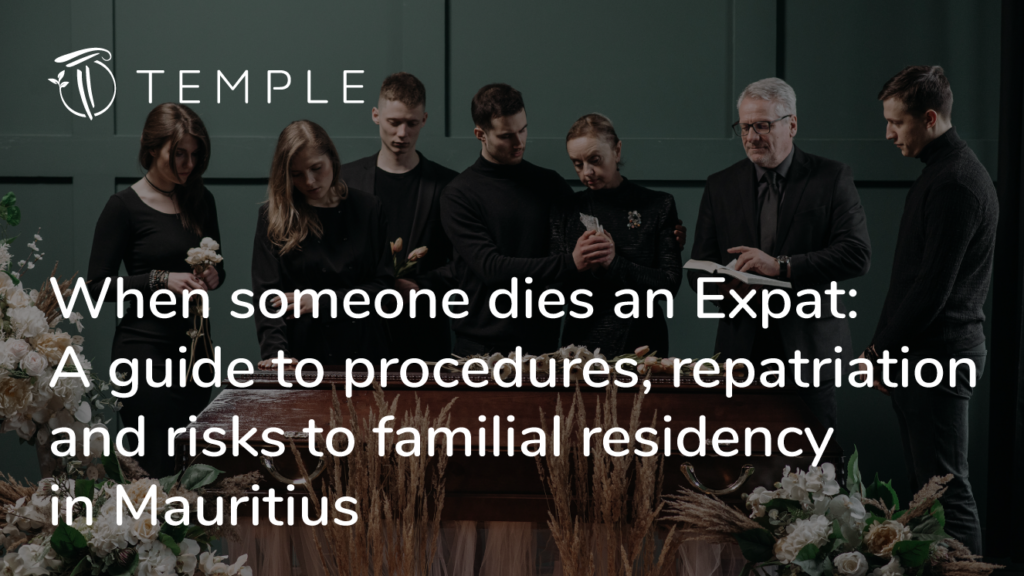Death and taxes. You came for the benefits of the one, and now your family is left to face the reality of the other. As Expats in the information gathering phase, most of our energy and concern is twirling enthusiastically around the imminent relocation, schools, culture and language barriers, safety and business climate. We are so focused on the incidental risks that we forget that it is a physical relocation of our living bodies. Our unavoidable demise fully catered for in our home country, right?
Yes and no. Whilst Mauritius has the added advantage of no inheritance or capital gains taxes (hello tax benefits), the reality is that succession laws in Mauritius are an animal in its own right and it should not be assumed that your foreign Will will protect your assets here in a cloned fashion. Forced Heirship Rules are enforced in Mauritius and are intricate. Any succession planning should be discussed with a Legal Professional (www.temple.mu) and a trusted Notary in Mauritius in securing a Will to cover Mauritian assets and in planning for your Expatriate family’s future.
Does my family retain Mauritian residency after my passing?
Depending on the family’s immigration status and their respective permits, it could well be that a Family has the right to still remain in Mauritius as Expatriates after the passing of a family member. Let’s look at some practical examples:
Peter holds an Occupation Permit as a Professional working for a Domestic company in Mauritius. Sarah, his wife and their 3 children are dependents on Peter’s Occupation Permit as the main applicant. In this scenario, Sarah and her children would need to move to another permit which will render Sarah the main applicant and allowing her children immigration dependency on her.
John and Nicki are married and incorporated a Domestic Company with equal shareholding having made an investment of USD100k (USD50k each) into their entity’s bank account in Mauritius. This granted them each investor status in holding respective resident permits as investors. Should either Nicki or John meet their demise, the other’s permit will not be affected in terms of their respective residency status as investor.
There is obviously a vast landscape of scenarios which always remains a good idea to discuss with an immigration professional in ensuring that the immigration status of your family is protected whilst you are still around to secure same.
Process of death formalities (death certificates and cremation etc.) and restrictions around burial and cremation for expatriates.
The law does not provide for any different procedure for registration of the death of a foreigner to acquire a local death certificate in Mauritius. This is kicked off by way of an application at the civil status office of the locality within the district where the death occurred or where the deceased last resided. After registration a permit is issued authorizing burial/cremation. On this note, following the statement of the cause of death by a doctor, the death certificate is provided at the hospital.
There is a pivot to the process in the event of an expatriate’s death in order to authenticate the local death certificate by way of approaching the Consulate of the country of origin. In some cases, such as for the registration for UK citizen’s death in Mauritius, an application can be done directly via the website for the registration of British citizen though this procedure is not mandatory for them since the domestic death certificate is acceptable in England.
Furthermore, the death of a foreign citizen, whether resident or tourist, ought to be reported to the Citizen Services Unit of the country of origin in Mauritius. For instance, the death of Americans in Mauritius is reported to the ACS Unit in order to issue a “Consular Report of Death of an American Citizen Abroad” which is needed to sort out legal and estate proceedings in the US.
Cremation of expatriates in Mauritius is possible via cremation facilities around the island, like Elie & Sons Ltd Funeral Directors. The procedure shall be started by providing the death certificate and cremation permit. Similarly, for burial a burial permit is needed from CSO after obtaining the Medical Death Certificate.
What if I want to repatriate my remains to or from another country for my burial?
Importing ashes/human remain to Mauritius
The importation of ashes into Mauritius is subject to the clearance from the Ministry of Health and Quality of Life and the process is triggered by informing the Mauritian Embassy in the country of death. There is a strict requirement to produce relevant supporting documents and the full cost for repatriation of human remains/ashes are to be borne by the family of the deceased.
In addition to this, each airline has its own distinct requirements for the special baggage transportation of ashes and such requirements may include a form to be filled for the carriage of urns, the death certificate stating the cause of death, copy of passport/ID, cremation certificate and certificate from the undertaker confirming that the urn is hermetically sealed. You will also be required to obtain a letter of no objection to the disposal prior to the transportation to Mauritius.
Exporting ashes/human remain from Mauritius
Following a cremation in Mauritius, the ashes can be transported to the country of origin (subject to the varied protocols in different countries) in a hermetically sealed container and endorsed by the death certificate and a statement from the crematorium director that the urn is composed of ashes only. It is important to note that exporting ashes to a foreign country is subject to the distinct protocols of the different countries concerned.
Repatriation process for remains for expatriates to country of origin in case of death.
Generally, foreigners in Mauritius get in touch with funeral agency providers around the island in order to arrange with the concerned authorities for the complete process of repatriation after a formal identification of the remains. Before repatriation, the human remains/corpse ought to be embalmed since it is mandatory for the corpse to be interred within 24 to 30 hours after death.
A brief procedure of repatriation for some countries are as follows:
France: The embassy should be informed, and declaration of the death should be made at the civil status. Prior to repatriation, a permit should be granted before the transportation of the human remains, and another permit is also needed by the mairie in France prior to disposal. It is to be noted that the local death certificate ought to be authenticated through apostille.
England: The procedure for British citizen is straight forward in the sense the Mauritian death certificate is recognised in England, hence facilitating the procedure.
India: The assistance of the High Commission of India is needed for procedural matters.
Philippines: The Consulate of Philippine’s assistance is needed for the repatriation procedures.
Ukraine: In this case the procedure is more technical since the embassy is situated in Pretoria, which means that the procedure will be considerably lengthier in view of the geographical scope.
If you would like a free 30 minute consultation to assess succession insofar as the immigration status of your family in the event of the main permit holder’s passing, please email Temple on [email protected].





